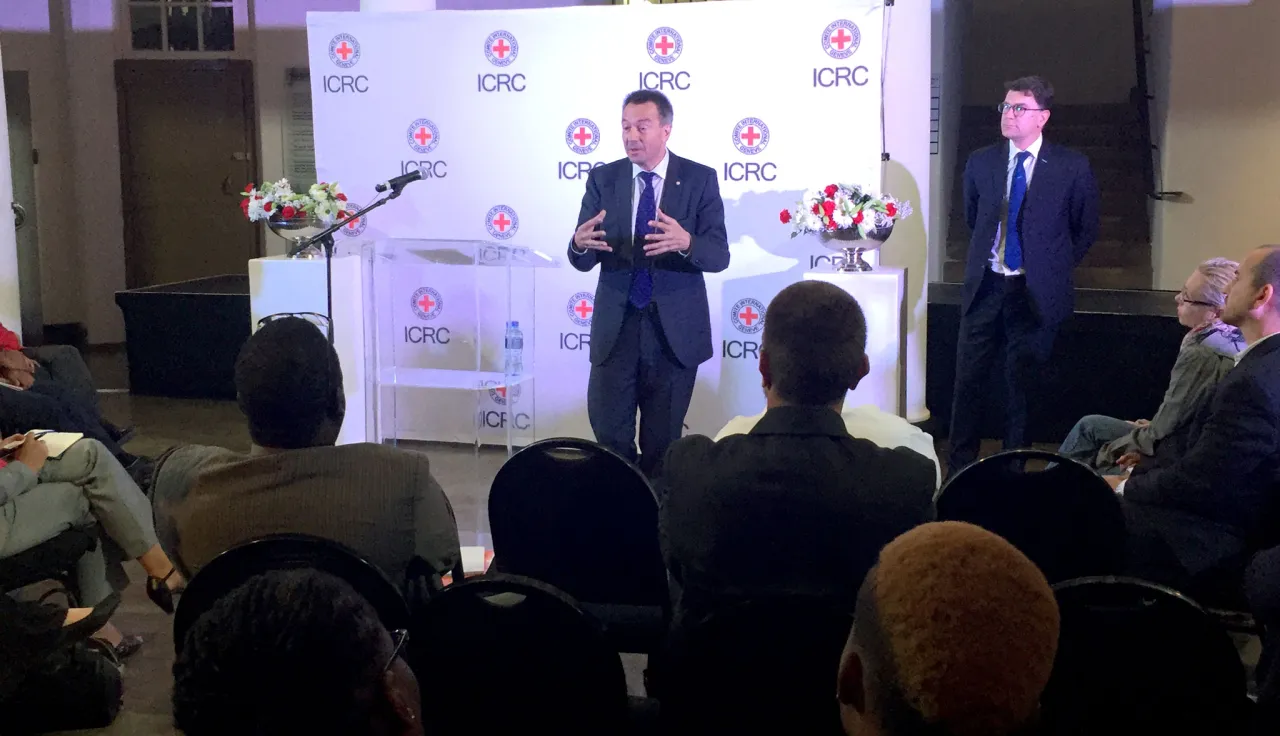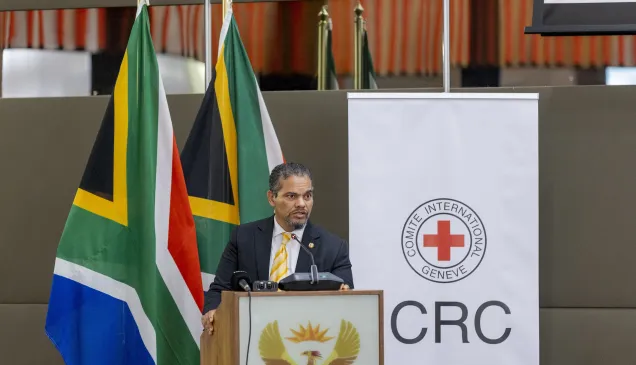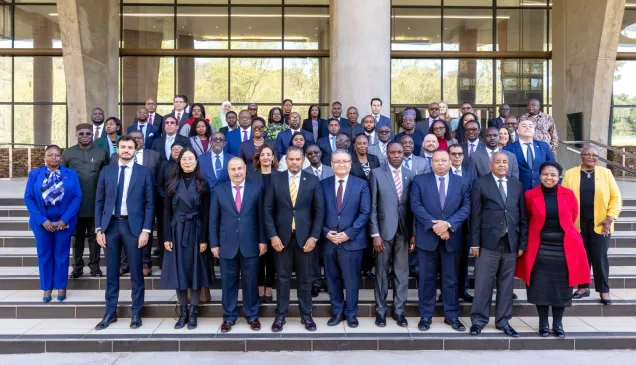Speech by ICRC president at Constitution Hill, Johannesburg, South Africa

Speech by Peter Maurer, president of the International Committee of the Red Cross, at Constitution Hill, Johannesburg, South Africa, on 20 October 2016
Honoured guests,
Distinguished colleagues,
I am honoured and humbled to be here with you this evening at Constitution Hill. The significance and symbolic weight of this location is deeply moving, and affords us the opportunity to reflect on the past, and the manner in which history influences the present, and more importantly the future.
Constitution Hill has a long history, as a fort, as a prison, and now as site of the South African Constitutional Court. This history of different and evolving functions speaks directly to the responsibilities and functions of the International Committee of the Red Cross (ICRC), as bestowed upon it by the Geneva Conventions.
This complex, over a hundred years old, was born in conflict. In its early days at the end of the 19th Century, it served as a military defence post. So too, the ICRC was born out of conflict, when our founder, Swiss businessman Henri Dunant witnessed the horrors of the Battle of Solferino in Italy in 1863.
As you all know better than I, much of Constitution Hill's history is tied up to its reputation as 'The Fort' - a military and political prison notorious for human rights abuses and harsh treatment. This touches the heart of the ICRC's mandate as our history is rooted in reducing and preventing suffering, in our will to work in places of detention to prevent the kinds of abuses that once took place here. The ICRC has made conditions of detention a priority since 1915, engaging on behalf of persons deprived of freedom, including here in South Africa during the Apartheid era.
Finally, Constitution Hill now houses the South African Constitutional Court - the ultimate proof that justice has triumphed over violence. For my organization, this image is inspiring: born out of darkness, the light prevails. And likewise my colleagues, who work tirelessly to promote the laws of war, prevail, to protect humanity amidst the tyranny of armed conflict.
I want to particularly note the significance of being in the Old Women's Gaol – in recognition of the role played by the women in the struggle for freedom here in South Africa. Often times, the history of conflict - both of its perpetrators and of its victims - is portrayed like a history of men. And yet, the more I travel the world, the more I see both the unique impacts of oppression and violence on women, and the significant role women play in reducing and responding to armed violence.
Dear Colleagues, I stand before you today on a return visit. Many years ago now, my first mission as a Swiss diplomat brought me to South Africa, where I was stationed in Pretoria and first discovered the beauty and strength of this country and its people.
At that time I first became aware of the ICRC's work in South Africa regularly visiting political prisoners on Robben Island, including most famously the late President Nelson Mandela. In 'The Long Walk to Freedom", President Mandela himself wrote 'the International Committee of the Red Cross was the only organization that both listened to our complaints and responded to them....this was vital, because the authorities ignored us."
ICRC's history in South Africa dates back over 50 years to 1963, when it first began visits to Robben Island. Over time, the ICRC increased its protection work, as well as growing its operation to include responding to the humanitarian needs of many different individuals, not just prisoners.
A milestone for us together was in 1980, when the ICRC President received a declaration from African National Congress President Oliver Tambo committing the ANC, in case of armed conflict, to respect of international humanitarian law (IHL) provisions contained in the 1949 Geneva Conventions and 1977 Additional Protocols.
Seven years ago, in 2009, my colleagues held an event commemorating 150 years of the battle of Solferino in this exact room. My colleagues told me that they were honored to hear from Ahmad Kathara about his experiences with the ICRC, and to help facilitate a reunion of many prisoners who had not seen each other since their periods of detention.
Friends, it is with this history in mind that I wish to share with you some reflections on my visit. Tonight is the final night of a 10-day trip that brought me to three African countries.
I have visited the ICRC delegations in North East Nigeria and seen firsthand the suffering of communities ripped apart by conflict. Throughout the region, in Nigeria, Niger, Cameroon and Chad, innocent civilians have become victims of armed violence, often in direct contravention of International Humanitarian Law. The region suffers from many of the same traumas that we see elsewhere on the globe, gross violations of civilian rights, attacks on medical facilities and humanitarian personnel and the scourge of sexual and violence. We are concerned to see conflicts become increasingly protracted, long-term, complex, with massive impacts on people beyond national borders, affecting neighboring countries and de-stabilizing whole regions.
My colleagues in this region are working incredibly hard to respond to the needs of the victims of this conflict. In Northeast Nigeria, we provide food, shelter and essential household items to internally displaced persons. Our teams also facilitated access to clean water, shelter, medical care, and restored family links. In Chad, we recently distributed seeds and essential farming equipment, and conducted livestock vaccinations, to help ensure families could continue with their agricultural livelihoods. Throughout the region, the ICRC works hand in hand with national Red Cross societies to deliver the essential supplies to help people sustain themselves in times of conflict. However, while we continue to provide this humanitarian relief, we also rededicate ourselves to the principles of prevention, trying to ensure that the violations don't happen, instead of merely responding when they do.
We are also forced to envisage humanitarian action in a different way today with protracted, long-term conflicts dominating the scene. While we were founded 150 years ago in order to respond to temporary disruptions due to war, we increasingly operate long-term in many contexts, particularly in Africa, in response to situations of chronic underdevelopment. This also leads us to think and act differently with regard to issues of peace, development and humanitarian action. While principled humanitarian assistance and protection work – neutral, impartial and independent - is still of critical importance, we have to consider the impact of such work on long-term development, on violence and conflict in society and on the stabilization of lives and livelihoods of people.
With increasing numbers, intensity, complexity and impact of wars and violence on societies in Africa, we see a different role for humanitarian actors than just ten or fifteen years ago: while in 2000 when the Millennium Development Goals were approved, the hope was that war and violence would taper away with economic and social development and relegate humanitarian action to a residual activity, our fear today is that violence and war are massively destroying development gains of the past decades. Humanitarian assistance and protection work in such new contexts is thus of increasing and strategic importance in preventing further degradation and allowing more ambitious objectives in the future. From a residual emergency activity humanitarian action has thus become a key area and a foundation for more ambitious work in view of long-term stability and development.
And so, while the situation remains bleak for the victims of these senseless wars, I nonetheless remain optimistic that a better future is in store and that humanitarian action today is a critical building-block on the way.
Arriving here in Johannesburg, I cannot help but be struck by the example set by the South African experience - of overcoming a history of conflict to build a functioning and advanced society working towards a better life for all its citizens. While it is true that the country continues to face many challenges, I am also struck by the opportunity that it thus has to continue to establish itself as a continental – and global – voice for humanitarian principles.
When President Mandela wrote in Foreign Affairs (1993) 'human rights will be the lights that guide our foreign affairs', he was giving voice to the thoughts of a nation that had suffered for too long from violence and injustice. President Mandela understood very well the great weight that South Africa carried, and the great potential that South Africa continues to have to work towards a more prosperous and harmonious future across Africa and the world.
Yet, as we know, conflicts across Africa continue to rage, causing innocent loss of life, depriving peoples of economic opportunity and shattering dreams of a better future. As a neutral, independent, impartial humanitarian organization, the ICRC remains committed to provide support and comfort to those who are suffering the consequences of this violence.
However, within the ICRC we also understand that the future of humanitarian action rests most deeply in the hands of the states and citizens of Africa. More than ever, the role played by national Red Cross and Red Crescent societies, such as the South African Red Cross Society, is crucial to an effective humanitarian response. These national societies, built from the civilians of each country, are a reflection of the will of those citizens to respond to the needs of their fellow countrymen.
Furthermore, I look at South Africa's vibrant and engaged civil society, and am reminded that it is increasingly national and local NGO's that play the most prominent role of first responders in crises. These local organizations are the most well equipped to understand the unique cultural, geographical and logistical challenges of humanitarian action in their own context, and it is incumbent we continue to empower and engage with local organizations as we continue our humanitarian efforts.
The role of Africa's business and corporate sector in prevention of and responding to wars and fragility will continue to grow. The increasing relevance of corporate social responsibility will help drive businesses towards responsible decisions and choices in where, how, and with whom to invest, and we urge the business community to consider the humanitarian consequences of investment and business practice. South Africa, with its advanced and diversified economy, must be at the forefront of these processes.
I know that South Africa is also home to some of the most innovative technology and engineering companies in the world. Increasingly, the humanitarian community relies on technological innovation to meet the challenges of complex and multifaceted disasters. Aerial drone surveillance of disaster needs, mobile phone cash transfers, and GIS mapping are some of the areas of potential for South African businesses to continue to develop technology to be used by organizations like the ICRC.
Finally, for the ICRC, humanitarian values need South African commitment, and a diplomatic role for South Africa. I have seen firsthand the consequences of the lack of respect for humanitarian values and humanitarian law in Africa and elsewhere. This troubling trend requires us to redouble our efforts to protect humanity. But the ICRC and other humanitarian agencies cannot do it alone. South Africa's voice and support is essential to ensuring that we protect victims of violence before, during, and after armed conflict.
South Africa is in a unique position in this regard. Few countries can draw on the kind of history that South Africa has, to learn from the past to build for the future. Drawing on its history and commitment to humanitarian values, South Africa can and should use its status as the key African diplomatic player to enable more sustainable and effective responses to the humanitarian consequences of armed conflict and violence across the African continent. South Africa already engages diplomatically, with mediation and negotiation support, and with Peacekeeping commitments. But I also believe that it can do more, and can play a key role in standing against repeated violations of IHL. This can be at the African Union, within SADC, and even bilaterally and multilaterally where South Africa has a seat at the table in mediation and negotiation processes.
Regionally, South Africa can also ensure that SADC continues its commitment to regional peace and stability, a critical role in promoting respect for and compliance with humanitarian values and law during armed conflict and violence. The ICRC hopes to continue to build its dialogue and engagement with the SADC Member States and Secretariat to ensure that we continue to protect humanity together.
Let me conclude by looking forward. I am realistic and pragmatic about the challenges Africa faces in its internal conflicts. The ongoing crises in CAR, South Sudan, Lake Chad and Somalia are devastating in their humanitarian impacts. Yet, I remain optimistic that the trajectory of peace continues to move forward. I am heartened by the increased sense of shared responsibility and shared sacrifice that countries in Africa are making on behalf of peace and humanitarian action. And I believe that the future of humanitarian action in Africa is one driven by the energy and action of the citizens of African states' themselves, working together with the ICRC, Red Cross national societies and other international actors.
Friends, once again let me thank you for joining me at this historic site and I look forward to your questions.



